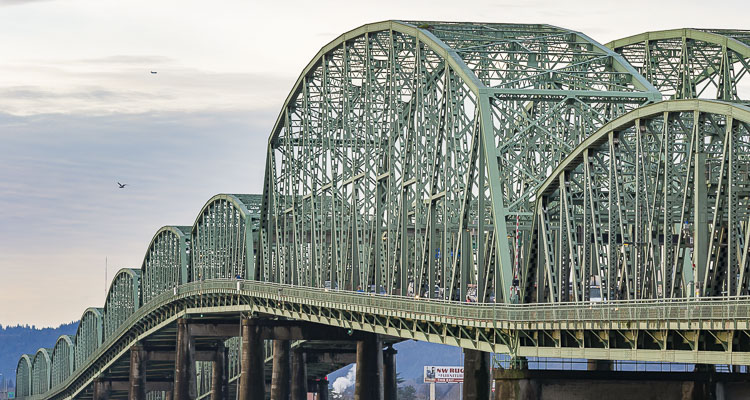
Citizens testify to Bi-State Interstate Bridge Replacement Committee about Friday’s revelation of $7.5 billion freeway expansion
On Monday, Administrator Greg Johnson and the Interstate Bridge Replacement (IBR) Project Team presented their updated $6-7.5 billion cost estimate to the bi-state committee of Oregon and Washington lawmakers overseeing the freeway expansion mega-project.

Lawmakers on both sides of the Columbia asked critical questions about the costs and requested more detail. One hundred percent of public testimony was critical of the mega-project’s scope and spiraling costs. In response, Administrator Johnson closed the hearing with a line in the sand: “Guess what? That number will not get smaller.”
“The Just Crossing Alliance supports a safe crossing of the Columbia, and climate-forward solutions like public transportation options that are frequent, reliable, affordable, and connected with our communities’ needs,” said Chris Smith of No More Freeways, a member of the Just Crossing Alliance. “What we heard today was another stunning admission by the IBR team: of the $7.5 billion dollars they want from the public purse, zero dollars are for operating public transportation. In the climate emergency, that is outrageous and unacceptable.”
“We want this crossing to prioritize climate goals, clean air, and connected communities, and that means public transit needs to be at the center of this project. The bridge is only a fraction of what is otherwise mainly a massive freeway expansion project,” said Cassandra Wilson of Sunrise Movement Rural Oregon, in her testimony. “Do away with the rebuilt interchanges and additional lanes and you’ll also be doing away with a huge chunk of the cost, as well as emissions. Please don’t indebt my generation and future generations to further climate chaos and bigger freeways.”
“My son Seamus was 22 months old when he was killed by a careless driver in a crosswalk near our home in Portland,” testified Michelle DuBarry of Families for Safe Streets, another Just Crossing Alliance member. “What good is a shiny new bridge when our kids can’t safely cross the street in our neighborhoods? Motor vehicle crashes are the most common way for children to die in the U.S. We desperately need a more balanced approach to transportation, and I respectfully request that this committee look at lower cost options so that we have funding for our neighborhood streets.”
“We invite committee members in both states to right-size this project to create a safe crossing with better transit and active transportation connections, and not to expand highway capacity which would increase pollution that causes health harm today and makes the climate crisis worse,” said Paulo Nunes-Ueno of Front and Centered, an environmental justice coalition in Washington state with more than 70 member organizations who are communities of color and frontline communities statewide, and a member of the Just Crossing Alliance.
The Just Crossing Alliance urges Oregon and Washington lawmakers to steer the public’s dollars into transportation solutions that will reduce – not expand – climate warming pollution. This includes safe and accessible public transportation, electrification, and safe streets for all users.
Monday’s hearing comes on the heels of an IBR press release on Friday announcing a doubling of projected mega-project costs, from a previous range of $3.2 to $4.8 billion to $5 to $7.5 billion. Monday’s hearing confirmed that a large portion of the project costs result from freeway and interchange expansions, notably on Marine Drive in Portland which was called “the second most expensive aspect of this project” and is not essential to ensuring seismic resiliency or public transportation options on the bridge.
Lawmakers on both sides of the river questioned the IBR team about the plan to operate light rail service and how it will be financed, to the response that there is no plan at this time and it is not factored into appropriation requests from Washington or Oregon. It was noted that securing these operations funds is an essential step to securing capital construction grants from the federal government for the light rail.
The Just Crossing Alliance (JCA) is a bi-state coalition of 32 community and advocacy groups focused on ensuring that the replacement of the Interstate 5 bridge is seismically safe, climate forward, and right-sized for our region. More information at justcrossing.org.
New projected costs
The new projected cost identified an estimated range of $5 to $7.5 billion, which was created by internal and independent experts, including a rigorous process that considers cost escalation and inflation factors affecting transportation projects across the country. According to the IBR team, those factors include historically high inflation rates, workforce shortages, materials cost increases due to supply chain issues, and other market conditions.
“Construction projects across the country are experiencing unprecedented cost increases due to supply chain issues and increasing material and labor costs as well as other factors, and our program is no exception,” said Johnson. “We are confident that the program will land within the projected cost estimate range, and we are actively working to secure funding and manage cost escalation risks.”
The previous conceptual cost estimate identified a high end of $4.8 billion when it was developed in 2020, based on the scope of the previous Columbia River Crossing project. The new cost estimate for the IBR program covers the components of the Modified Locally Preferred Alternative, which in July 2022 was discussed with the Bi-State Legislative Committee and endorsed by the regional program partners of the Executive Steering Group.
The Modified Locally Preferred Alternative includes:
- Replacement of the Interstate 5 bridge over the Columbia River
- One auxiliary lane southbound and northbound, and three through lanes
- Extension of light rail transit from Portland to Vancouver to connect the existing bus rapid transit complemented by express bus service
- The addition of three new light rail station locations including the at-grade Evergreen station
- Replacement of the North Portland Harbor Bridge
- A partial interchange on Hayden Island
- A full interchange on Marine Drive
- A bridge from Marine Drive to Hayden Island for access to North Portland
The new estimate sets the foundation for developing the program’s financial plan, anticipated in early 2023, which will include additional details on estimated funding sources and financing approach. Funding for the cost estimate will require revenue from a diverse range of sources, including federal funds, state funds from both Oregon and Washington and tolling. The anticipated cost falls within the range of confirmed and potential funding sources currently identified, which include:
- Existing state funding – $100 million
- Connecting Washington transportation package – Mill Plain Interchange – $98 million
- Move Ahead Washington transportation package – $1 billion
- Anticipated Oregon funding – $1 billion
- Toll funding – $1.25 to $1.6 billion – This range is consistent with toll revenue estimates for the prior program. A Level 2 Traffic & Revenue analysis for IBR will be reviewed by both states.
- Federal grants – $860 million to $1.60 billion
- Federal Transit Administration New Starts Capital Investment Grants – $900 million to $1.1 billion
“Controlling costs for a mega project like the Interstate Bridge Replacement program is a dynamic process, and we will continue to identify and refine possible funding sources and address cost escalation risks and opportunities,” said Johnson. “As we work to minimize costs within our control, we will keep our focus on delivering a multimodal replacement bridge and transportation corridor that keeps our region’s economy moving and improves safety. Regional and national partner support, combined with state and federal funding which we have already received and for which we are well positioned, presents us with a unique window of opportunity to get this project completed.”
Some information in this report was provided by the Interstate Bridge Replacement Program.
Also read:
- Opinion: Hiding the growing cost of the Interstate Bridge replacementJoe Cortright of the City Observatory addresses the rising cost of the Interstate 5 Bridge replacement project.
- 90 minutes of delay on Southbound I-5 in Southwest Washington on Friday afternoon, July 26Travelers using southbound Interstate 5 through Woodland should expect up to 90 minutes of delay during Friday afternoon and evening and should delay travel or prepare for additional travel time.
- Nighttime paving work on I-5 and SR 14 in Clark County July 28-Aug. 9Nighttime travelers in Clark County should expect delays for maintenance and paving work beginning Sunday, July 28 until the morning of Friday, Aug. 9.
- Northeast 182nd Avenue/Northeast Ward Road to be closed on Aug. 1Northeast 182nd Avenue and Northeast 172nd Avenue in Clark County will have single-day closures on August 1 and August 5 for road preservation, with detours in place.
- Interstate Bridge Replacement program awarded $1.499 billion FHWA Bridge Investment Program grantInterstate Bridge Replacement program officials have shared that the program received $1.499 billion through the Federal Highway Administration’s Bridge Investment Program.









